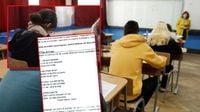On Monday, March 24, 2025, high school seniors across Romania participated in the first test of the Baccalaureate (BAC) 2025 simulation, focusing on Romanian Language and Literature. This event marked a significant milestone for approximately 123,000 students, who were distributed across 1,318 exam centers nationwide.
Access to the examination halls was permitted until 8:30 AM, with candidates beginning to tackle the assigned subjects at 9:00 AM. This simulation aims to prepare students for the actual Baccalaureate exams scheduled for June and August 2025.
As students entered the exam rooms, they were greeted by their supervising teachers, who guided them through the process. Each student was required to present an identification document, a crucial step in the examination protocol. The subjects were distributed in sealed envelopes by teachers from the organizing committee, ensuring a standardized testing environment.
However, the simulation did not come without its challenges. Many students found themselves grappling with the classification of novels. A notable instance involved the confusion surrounding the categorization of the novel "Ion" by Liviu Rebreanu. One student shared, "I chose 'Ion', but my teacher told me I should have selected 'Ultima noapte de dragoste, întâia noapte de război.' Many of my classmates made this mistake too. I was a bit annoyed because I would have known 'Ultima noapte…' but that’s how it goes; it’s just a simulation.”
Adelina Beldugan, a teacher, commented on the situation, stating, “For question three, I’m sure there will be confusions because many students gravitated towards the psychological novella 'Moara cu noroc.' In fact, the novels intended for analysis included, among others, 'Ultima noapte de dragoste, întâia noapte de război' by Camil Petrescu; 'Patul lui Procust' by the same author, 'Maitreyi' and 'Nuntă în cer' by Mircea Eliade, and 'Ioana' or 'O moarte care nu dovedește nimic' by Anton Holban.”
Another issue arose from a typographical error in the test materials. Some students misread the title of the poem "Iarna" (Winter) as "Iama" due to the close proximity of the letters "r" and "n" in the printed text. This led to misunderstandings in their analyses of the poem's themes and artistic devices.
Despite these hurdles, the simulation serves as a vital preparatory tool for students, allowing them to familiarize themselves with the examination format and expectations. The results from this simulation will be communicated to students through their teachers on April 8, 2025.
Looking ahead, the Romanian Language exam for the June-July 2025 session is scheduled for June 10, while the August session will take place on August 11. This structured approach to examinations is designed to enhance student performance and readiness for the final assessments.
The Ministry of Education and Research (MEC) has outlined a detailed calendar for the Baccalaureate exam process, which includes various stages such as the evaluation of oral communication skills and digital competencies. The first phase of the actual exams will commence with the Romanian Language test, followed by other subjects over the subsequent days.
In preparation for the Baccalaureate, students are advised to focus on the curriculum changes, which have seen the removal of certain content areas in subjects like Romanian Language, Mathematics, History, and Geography. Notably, the Romanian Language syllabus excludes post-war dramatic texts and canonical authors such as Titu Maiorescu and Eugen Lovinescu.
Moreover, the digitization of the evaluation process aims to streamline the correction of students' works. According to the MEC, the anonymity of students' submissions will be maintained through a digital platform that automatically anonymizes personal data. This marks a significant shift from previous years when physical seals were used to secure students' identities on their exam papers.
As the examination period approaches, both students and educators are encouraged to engage with the materials and guidelines provided by the MEC to ensure a smooth examination experience. With the stakes high, the Baccalaureate represents a crucial step in the academic journey of Romanian high school students, shaping their futures and opportunities.
In conclusion, while the simulation has revealed areas for improvement, it also highlights the commitment of students and educators to navigate the complexities of the Baccalaureate process. As they prepare for the actual exams, the lessons learned from this simulation will undoubtedly play a pivotal role in their success.





